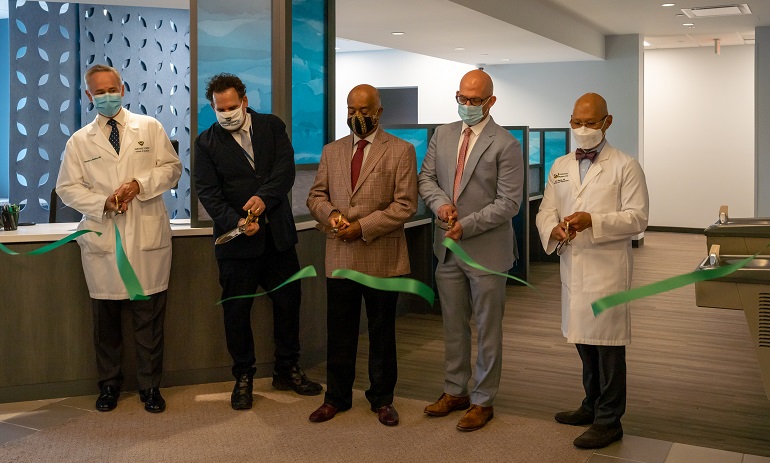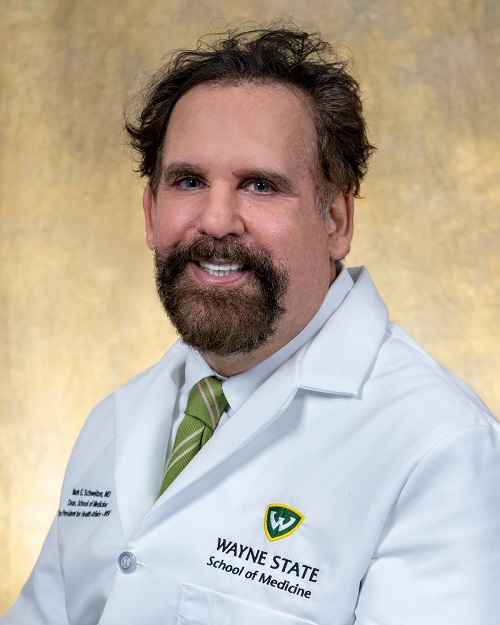
Becoming the new dean of a medical school is a challenging – and sometimes daunting – task. Doing so as a deadly pandemic consumes the world certainly complicates the mission.
Mark E. Schweitzer, M.D., dean of the Wayne State University School of Medicine and vice president of WSU Health Affairs, marked his one-year anniversary April 27. He did not allow the COVID-19 pandemic to delay or interfere with his agenda for preparing the school to face the further challenges of the 21st century.
“My pride has only grown during this past year as I watched our students, faculty and alumni overcome challenges with resilience and focus with passion on learning and caring for our patients and community, hallmarks that make for great physicians and a health care community that will make a difference,” Dean Schweitzer said upon the occasion of his anniversary.
Foremost on his agenda was ensuring that medical school students could safely continue their education in the face of the pandemic. That could not have been accomplished, he said, without the faculty and staff. “I have learned what a great medical school we have and how devoted our faculty and staff are to providing an exceptional education,” he said.
He also focused on financial issues and accumulated deficits the School of Medicine faced to provide long-term sustainability. This included implementing new compensation models and paying off debt with his incoming dean’s fund, as well as reducing his own salary.
Curriculum enhancement continues under Dean Schweitzer, with new programmatic offerings to ensure medical students have the ability to align their interests with the curriculum.

He also ordered the development of the new Trailblazer Fellowship to help prepare medical students to lead as physicians, researchers and policymakers. The fellowship’s first cohort consists of 40 third-year students. Sessions will be scheduled monthly for an 18-month period. Fellows will receive a certificate upon completion of the program and will have the opportunity to engage in several community-based initiatives to create meaningful health care ventures with true societal impact.
The fellowship will be taught through a combination of lectures, readings, movies and breakout sessions. Speakers will include local, national and international leaders in health care. Topics will include areas such as leadership development paths, maximizing team dynamics, how physicians can influence public policy, solving America’s health care crisis with strategies that work for everyone, structural racism in health care, the future of primary care and team-based management, investing in social impact projects to make real change, avoiding physician burnout, health care economics, ethics, big data in science, international health care, implicit bias and microaggressions, and many more.
Dean Schweitzer also forged an agreement that makes one of southeast Michigan’s largest multi-specialty medical groups the school’s newest affiliates for the training of medical students. Michigan Healthcare Professionals, with 169 outpatient offices and diagnostic centers, expands the opportunities for critical hands-on training for WSU medical students in outpatient settings.
With the future of medicine focused on population health and enhanced wellness-based care models, MHP’s network of highly-experienced physicians will provide students with advanced training in community outpatient settings, where the majority of patient primary and specialty physician encounters occur. MHP providers are nationally known for several specialties, including oncology and radiation therapy. The affiliation broadens the medical student experience beyond inpatient settings and provides students with the opportunity to understand the continuum of care in a patient-centered care model from wellness and prevention through to chronic and acute illness and injury.
During Dean Schweitzer’s first year U.S. News and World Report named the School of Medicine a Top 100 medical school for research in its annual Best Medical Schools rankings. The magazine ranked the School of Medicine 66th in research of the 188 medical schools eligible for ranking. Last year the school ranked 71st in the category. The school also was ranked 89th in the category of Primary Care.
Known for urban clinical excellence focusing on medical and biomedical education, clinical experience, research and community care, the WSU School of Medicine also ranked 26th among Most Diverse medical schools and 51st in Medical Schools With the Most Graduates Practicing in Health Professional Shortage Areas.
This is the first year that the magazine published a ranking of the most diverse medical schools. The Howard University College of Medicine in the District of Columbia took first place in the new ranking, which considers the proportion of students who are Black or African American, Hispanic/Latinx, American Indian or Alaska Native, or Native Hawaiian and other Pacific Islander.
Dean Schweitzer also oversaw the renaming of the physician faculty group from Wayne State University Physician Group to Wayne Health, and the opening of the organization’s new headquarters at 400 Mack Ave. in Detroit.
Services offered at the newly renovated 50,000-square-foot health care facility include a full range of integrated primary, preventive and behavioral health care by physicians and advanced practice providers in Internal Medicine, Family Medicine, Obstetrics and Gynecology, and Behavioral Health. The location is also home to the new Center for Population Health Accountability, offering novel, community-based and mobile approaches to “whole-person” care, addressing physical and behavioral health needs, and facilitating access to partner programs to address social determinants of health that impact well-being, such as poverty, housing, transportation and access to food.
“Wayne Health physicians have a long history of providing specialty care services for high-risk, vulnerable and underserved populations in Detroit,” Dean Schweitzer said. “With the launch of 400 Mack, Wayne Health is extending its mission by dramatically expanding access to coordinated primary care, preventive health and chronic disease management services, sustainably enhancing community health and well-being in the city.”
The Center for Population Health Accountability will use community-based, mobile outreach and technology-enhanced approaches to expand access to screenings, preventive health and chronic disease management services. The center will target interventions to specific at-risk populations in the city, guided by data from WSU’s Population Health Outcomes and Information Exchange, or PHOENIX, a novel health information platform.
Wayne Pediatrics, another WSU clinical partner organization, launched medical services for children at 400 Mack through a new Urban Children’s Health Collaborative aimed at building a healthier future for children and families through primary and specialty pediatric care, medical education and training, and population-based research.
Other actions Dean Schweitzer has taken or presided over the last year include:
The Blue Ridge Institute for Medical Research, which provides an annual ranking of National Institutes of Health funding to medical schools and individual departments, placed the School of Medicine in the top half of medical schools securing NIH grant funding in 2020. National rankings include: Department of Family Medicine and Public Health Sciences, ninth; Department of Ophthalmology, Visual and Anatomical Sciences, 11th; Department of Emergency Medicine, 28th; Department of Urology, 36th; Center for Molecular Medicine and Genetics, 37th; Department of Neurosurgery, 41st; Department of Psychiatry and Behavioral Neurosciences, 42nd; Department of Radiology, 46th. The WSU School of Medicine ranks second in the state of Michigan’s medical schools in NIH grant funding.
Seeing the Class of 2021 achieve a national residency match rate of 99 percent, believed to be the highest rate attained in recent history.
Appointing a number of department chairs to fill positions that were either vacant or being held by interim appointees.
Seeing a record number of medical student applications (more than 10,000) for the incoming Class of 2025.
Expanding communication to School of Medicine students, faculty and staff through frequent virtual town hall meetings.
Presiding over the opening of the first Maternal Support Room for breastfeeding mothers on the School of Medicine campus.
Welcoming the first cohort of Wayne Med-Direct students into their first year of medical school. The program places highly-talented, traditionally underrepresented undergraduate students at Wayne State on the academic fast track to the WSU School of Medicine.